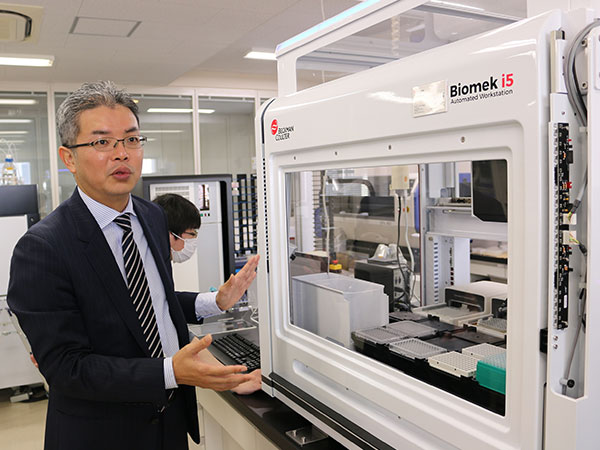Kobe University and the National Institute of Advanced Industrial Science and Technology (AIST) in Japan have developed a technology enabling the selection of proteins with a high affinity for drug target molecules (also proteins) on cell membranes. This discovery will advance research targeting membrane proteins linked to diseases such as cancer, and therefore has potential applications in the development of new biopharmaceuticals. The results of this research were published in the British science journal “Scientific Reports” on 19th November 2015 at 10am GMT.
This discovery is a result of joint research carried out by Kobe University doctoral student in the Graduate School of Engineering KAISHIMA Misato, Associate Professor at the Organization of Advanced Science and Technology ISHII Jun, Professor at the Graduate School of Engineering KONDO Akihiko, and Senior Researcher at the AIST Biomedical Research Institute Molecular and Cellular Breeding Research Group FUKUDA Nobuo. The defining feature of this research is that by using the yeast signal transduction machinery1 and the competitive protein binding principle, the group was able to identify mutant proteins2 that possessed an enhanced ability to bind with membrane proteins.

Membrane proteins play a vital role in controlling the physiological functions of living organisms, and abnormalities in these physiological functions cause diseases such as cancer. This means that molecules which can bind with membrane proteins and regulate physiological functions are potential candidates for drug development. The research team focused on the signal transduction machinery of yeast cells, which share many traits with human cells. Using the knowledge that the localization of signaling molecules on membranes is essential for the growth of yeast cells, they developed a method to select the proteins which bind with “membrane proteins”. Following this, by artificially creating an intracellular environment in which proteins competed to bind with each other, the research group enabled the selection of mutant proteins with an enhanced affinity for membrane proteins. They demonstrated that this procedure could be applied to human epidermal growth factor receptors3, a major target molecule for cancer treatment.
By identifying proteins that have a high affinity for membrane proteins, this technology facilitates the creation of new biopharmaceuticals for various drug targets. It could also potentially increase speed and reduce costs in the drug development process.
Glossary
- 1 Signal transduction machinery:
- transmits information about changes in the surrounding environment to the cell. Controls the destiny and physiological functions of the cell.
- 2 Mutant protein:
- a protein in which the amino acid components are altered.
- 3 Epidermal growth factor receptor:
- in normal tissue this plays a vital role in regulating cell division, replication, and maintenance, but if abnormalities occur in this receptor it can become involved in carcinogenesis and metastasis.
Journal information
- Title
- “Gγ recruitment systems specifically select PPI and affinity-enhanced candidate proteins that interact with membrane protein targets”
- DOI
- 10.1038/srep16723
- Journal
- Scientific Reports








